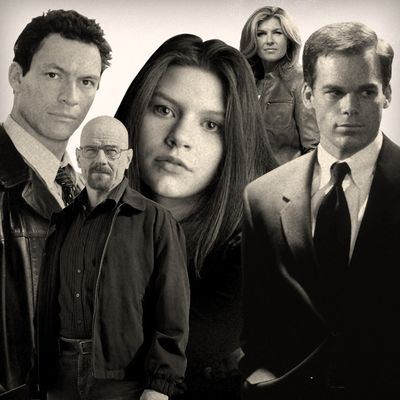
To get an idea of just how far we’ve all come as a nation — or, more specific, as a nation of drama-loving TV sponges — consider the home-viewing options that were available to viewers in the spring of 1990. For Richard Chamberlain fans, there was the doctor-drama Island Son; for Grieco groupies, there was the 21 Jump Street spinoff Booker; and for people who loved disappointment, there was Wolf, a cop show starring Jack Scalia and absolutely no wolves. The prime-time grid wasn’t all bad, of course: The Simpsons and Seinfeld had just made their debut, and a handful of late-eighties dramas (thirtysomething, China Beach, L.A. Law) were still kicking around. But for the most part, there wasn’t a lot of TV for grown-ups, unless you counted Matlock and Murder, She Wrote, which were for waaaayyy grown-ups.
All of which goes to explain the fizzy-headed clamor that greeted Twin Peaks upon its April 8, 1990 debut. Here was a show that was not only willfully, almost nonchalantly weird, but also seemingly unaware of the demands of the network drama: Characters disappeared and reappeared with little warning; seemingly benign props (logs, pies, a diner jukebox) became totems of lust or dread; and story lines took months to resolve themselves — that is, if they even resolved themselves at all. Twin Peaks was a TV show that didn’t seem to know it was a TV show, and its mere existence conveyed a strangely empowering message to TV viewers everywhere, people who’d long been content with neuron-dimming procedurals and plod-heavy soaps: You’re smarter than this.
Peaks marked an epochal moment for television, one that launched a whole new wave of inventive hour-long drama and, thanks to David Lynch’s very specific vision, birthed the era of the celebrity showrunner, the Head Motherwriter in Charge whom fans worshipped as much as or more than the shows’ stars, and upon whom they placed all responsibility for the show’s highs and lows. And so, when Vulture set out to organize the ultimate TV-drama bracket, which begins today, we used Peaks’ 1990 debut as our entry point, making it one of just sixteen shows we’ll be putting head-to-head in the next three weeks as we work toward crowning the best drama of TV’s New Golden Age. These are shows like NYPD Blue, Buffy, The Wire, and Breaking Bad — series with neatly tangled story lines, grimly hilarious dialogue, and characters who inspire loyalty, love, and the occasional fan-fic dispatch. Shows that (enabled by the immortalization of DVDs and streaming video) are strenuously worshipped or debated years after they went off the air: In the past two weeks alone, President Obama repeated his deep conviction that Omar is The Wire’s greatest character, while the AV Club heretically posted that the HBO model has damaged TV by making dramas more about the overall arc than individual episodes.
Beginning today, our all-star judging panel of novelists, journalists, actors, and playwrights will take on the daunting task of figuring out which of these shows deserve to progress in the bracket — and which must stay behind. (There’s already been some bloodshed when narrowing the contest down to sixteen entrants, with worthy shows like ER, Homicide, Dexter, Sons of Anarchy, and The Good Wife eliminated from the contest before it even began, kicked out by your heartless Vulture-editor star-chamber.) Every weekday, one of our judges — which include Sloane Crosley, Heather Havrilesky, Steve Almond, Paul Scheer, and more — will post his or her deliberations and decision on a different branch of the bracket, with the contest narrowing until New York Magazine TV critic Matt Zoller Seitz declares the ultimate winner on March 23. Meanwhile, you can vote for your own picks on Vulture’s Facebook page or tweet your feelings with the #dramaderby hashtag. Our hope is that by pitting such formidable foes against one another and by having a trusted team of TV whizzes to act as our referees, you’ll learn something new about these shows, no matter how many times you’ve already debated or rewatched them.
We expect plenty of arguments, of course, and we encourage you to air your grievances and/or commendations in the comments section. Unless you’re David Simon, of course. Dude goes on forever. Just text an Omar emoticon if you’re unhappy with us, okay, Dave?

